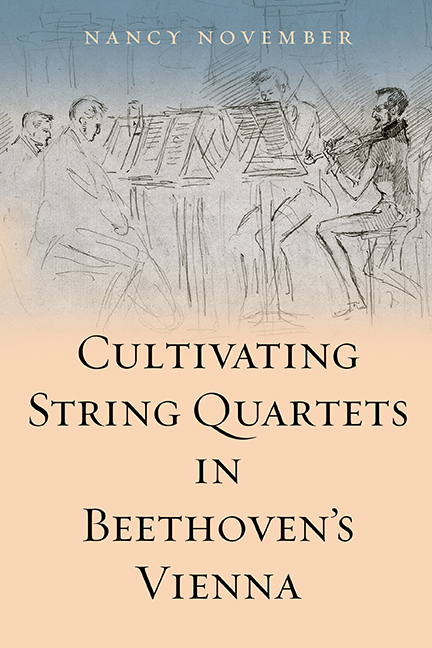Book contents
- Frontmatter
- Contents
- List of Illustrations
- List of Musical Examples
- Acknowledgements
- Introduction
- 1 Defining Chamber Music in the Early Nineteenth Century
- 2 Celebrating Haydn, Cultivating Opera
- 3 Selling String Quartets in Beethoven's Vienna
- 4 Locating String Quartets in Beethoven's Vienna
- 5 Early Nineteenth-Century Performance and Criticism
- 6 Sociability, Showmanship, and Study: ‘Quartet Friends’
- 7 The String Quartet and the Listener
- 8 Schubert's Song, Beethoven's Theatricality
- Epilogue: Constructing ‘Viennese Chamber Music’
- Bibliography
- Index
2 - Celebrating Haydn, Cultivating Opera
Published online by Cambridge University Press: 16 May 2018
- Frontmatter
- Contents
- List of Illustrations
- List of Musical Examples
- Acknowledgements
- Introduction
- 1 Defining Chamber Music in the Early Nineteenth Century
- 2 Celebrating Haydn, Cultivating Opera
- 3 Selling String Quartets in Beethoven's Vienna
- 4 Locating String Quartets in Beethoven's Vienna
- 5 Early Nineteenth-Century Performance and Criticism
- 6 Sociability, Showmanship, and Study: ‘Quartet Friends’
- 7 The String Quartet and the Listener
- 8 Schubert's Song, Beethoven's Theatricality
- Epilogue: Constructing ‘Viennese Chamber Music’
- Bibliography
- Index
Summary
In 1801, the year in which Beethoven published his first set of string quartets, Op. 18, the Viennese correspondent of the Allgemeine musikalische Zeitung reported: ‘Among composers most treasured and often played by the cognoscenti, the highest honours are rightfully accorded to Haydn.’ For composers of chamber music in Vienna around 1800, Haydn's name loomed large. This can be seen in the many compositions dedicated to Haydn or modelled more or less overtly on his chamber music (Beethoven's Op. 74, for instance), and in the large number of reprints of his works. In 1805, for example, the prominent Viennese publishing house Artaria issued Haydn's six ‘Tost’ Quartets Opp. 54 and 55 (first published 1789–90). The following year the quartets Op. 74 and Op. 77 (first published in 1796 and 1802) were reprinted. In 1807, the six string quartets that Mozart dedicated to Haydn were re-issued by Artaria, twenty-two years after their first publication. These ‘Haydn’ Quartets were especially popular, attesting to the posthumous status of Mozart as well as Haydn's celebrity. In 1803 another important Viennese publisher, Traeg, also re-issued Mozart's ‘Haydn’ Quartets.
This chapter considers the late phase in Haydn's career as a chamber music composer, and Beethoven's early career in ‘Haydn's Vienna’. I then take several career snapshots, comparing three other key composers of chamber music working in this ‘city of Haydn’ around 1800 who are little discussed today: Paul Wranitzky, Forster, and Gyrowetz. Rather than considering the influence of Haydn and Beethoven on their careers, as would befit a ‘grand narrative’ of chamber music's history, I focus on a significant source of inspiration for all these composers, Haydn and Beethoven included: theatre.
Around 1800, the theatre was central to Viennese culture, for musical, social, and political reasons. It provided entertainment and a congenial site for social interaction, and also a relatively safe place for representing and working out social problems and ideals. In turn, chamber music – like a miniature, non-verbal, semi-private theatre – offered an interactive, flexible, and potentially even safer medium in which to express and renegotiate social and aesthetic ideas. Such a medium was worthy of careful cultivation in the social upheaval of the Napoleonic era, and then in a post-Congress Vienna subject to stringent censorship.
- Type
- Chapter
- Information
- Cultivating String Quartets in Beethoven's Vienna , pp. 23 - 59Publisher: Boydell & BrewerPrint publication year: 2017



